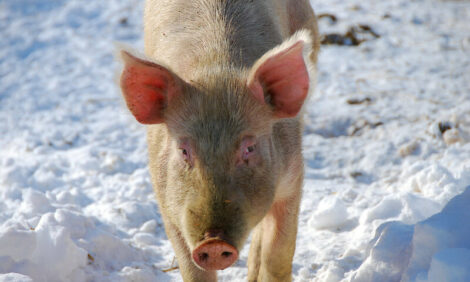



Manure Treatment System Erases Greenhouse Gases
US - Less greenhouse gas—and more carbon credits per pig—are the latest environment-friendly benefits being credited to an innovative hog waste-management system invented by Agricultural Research Service (ARS) scientists
The system was introduced in 2004 by soil scientists Matias Vanotti, Ariel Szögi and Patrick Hunt at the ARS Coastal Plains Soil, Water and Plant Research Center, Florence, South Carolina. It's being called the "Super Soil System," after Super Soil Systems USA Inc., a North Carolina company that implemented the system and markets it.
It turns pig waste into material for soil improvcers and fertilizers, while removing most suspended solids, phosphorus and ammonia from waste water.
In the latest research—conducted at a large North Carolina pig-finishing operation—ARS researchers found that replacing conventional anaerobic lagoon practices with the new system reduced greenhouse gas emissions by 97%.
It cut annual emissions from 4,972 tons of carbon dioxide equivalents to just 153 tons. This indicates the system may have a role in the fledgling CO2 trading market, which allows farmers to earn money based on how much carbon dioxide and other greenhouse gases they can prevent from entering the atmosphere.
The Super Soil System lets pig producers earn more carbon credits per pig than many of the techiques currently used, says Vanotti. And the improvements to a farmersccarbon credit rating can help to off-set installation costs associated with cleaner aerobic systems.
A full-scale demonstration of the system—the only on-farm technology certified in North Carolina to replace anaerobic lagoons—was possible through co-operation between North Carolina's Attorney General's office, Smithfield Foods, Inc., and Premium Standard Farms.
The full-scale implementation of a lower-cost version is under review and initial results look promising, say the developers.
It turns pig waste into material for soil improvcers and fertilizers, while removing most suspended solids, phosphorus and ammonia from waste water.
In the latest research—conducted at a large North Carolina pig-finishing operation—ARS researchers found that replacing conventional anaerobic lagoon practices with the new system reduced greenhouse gas emissions by 97%.
It cut annual emissions from 4,972 tons of carbon dioxide equivalents to just 153 tons. This indicates the system may have a role in the fledgling CO2 trading market, which allows farmers to earn money based on how much carbon dioxide and other greenhouse gases they can prevent from entering the atmosphere.
The Super Soil System lets pig producers earn more carbon credits per pig than many of the techiques currently used, says Vanotti. And the improvements to a farmersccarbon credit rating can help to off-set installation costs associated with cleaner aerobic systems.
A full-scale demonstration of the system—the only on-farm technology certified in North Carolina to replace anaerobic lagoons—was possible through co-operation between North Carolina's Attorney General's office, Smithfield Foods, Inc., and Premium Standard Farms.
The full-scale implementation of a lower-cost version is under review and initial results look promising, say the developers.








